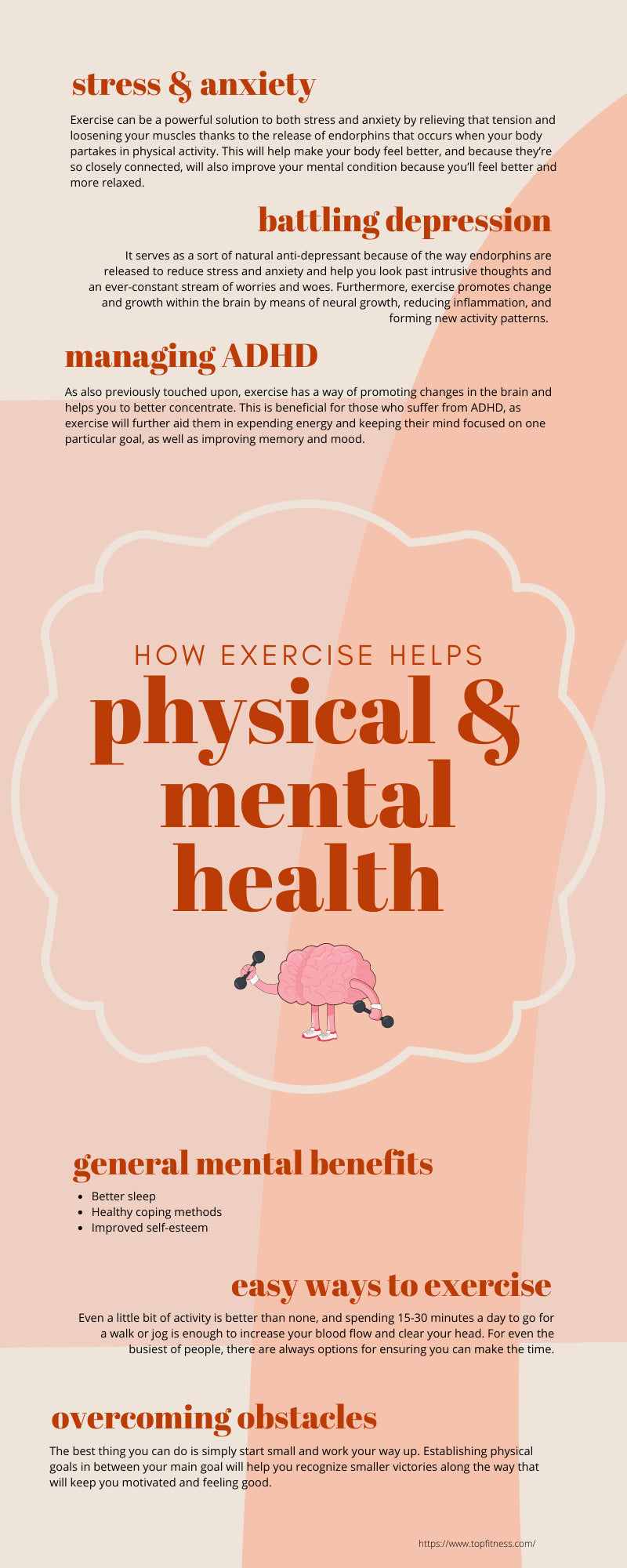
How Exercise Helps Physical and Mental Health
Share
While it’s obvious that exercise helps us to lose weight or build muscle, it’s lesser known that exercise has further benefits that pertain to other aspects of our health such as our mental health, and by extension, our emotional health. Even if you’re in good physical health, you should still encourage yourself to start a regular exercise routine and endeavor to stick to it. You needn’t simply take our word for it, however. We can instead show you how exercise helps physical and mental health at the same time.
Stress and Anxiety
Recall how your body feels when anxiety takes hold or when stress begins to weigh heavy on your shoulders. Your muscles tense up, a tightness forms in your chest, and painful aches develop in your neck and shoulders. Exercise can be a powerful solution to both stress and anxiety by relieving that tension and loosening your muscles thanks to the release of endorphins that occurs when your body partakes in physical activity. This will help make your body feel better, and because they’re so closely connected, will also improve your mental condition because you’ll feel better and more relaxed.
Exercise is like hitting the refresh button for your mind. It allows you to put aside your responsibilities and worries for a short time and lets you focus on yourself. The increase in your blood flow will help you feel more energized while sharpening your mind and allowing you to better collect your thoughts, so you won’t feel overwhelmed trying to keep track of whatever worries are running through your head.
Battling Depression
Because of the way exercise naturally relieves stress and anxiety, working out has been an effective way to help combat mild to moderate depression. It serves as a sort of natural anti-depressant because of the way endorphins are released to reduce stress and anxiety and help you look past intrusive thoughts and an ever-constant stream of worries and woes. Furthermore, exercise promotes change and growth within the brain by means of neural growth, reducing inflammation, and forming new activity patterns. This is important for keeping your head clear when depression would typically weigh it down and make it difficult to focus because of how over-burdened you might feel.
If nothing else, the exercise can serve as a distraction. It gives you a reprieve from the hardships of depression and allows you to break out of negative cycles that depression often drags you into.
Managing ADHD
As also previously touched upon, exercise has a way of promoting changes in the brain and helps you to better concentrate. This is beneficial for those who suffer from ADHD, as exercise will further aid them in expending energy and keeping their mind focused on one particular goal, as well as improving memory and mood. Much like how endorphins are released to relieve stress and pain, the brain will also release dopamine, norepinephrine, and serotonin—all of which play a role in allowing us to focus or pay attention.
General Mental Benefits
There are a multitude of benefits that exercise can give us that aren’t related to any mental health diseases, but rather are more general benefits that make for an improved and healthier lifestyle that anyone can benefit from. Some of these benefits include:
- Better sleep—Taking the time to exercise in the morning or afternoon can help you regulate your sleep schedule by expending excess energy and clearing your mind so that it’s much easier for your better to feel worn out and prepared to sleep, making it easier to get comfortable and doze off if your mind isn’t buzzing with activity. If you must exercise at night, it’s recommended you try using yoga or gentle stretching to promote feelings of calm so your body feels re-energized and alert right before bed.
- Healthy coping methods— During periods of intense strife and instability, many people fall to vices like alcohol and drugs to try and help themselves cope with the stress and anxiety. Developing the discipline and self-control of sticking to an exercise routine will help you make healthier coping choices and improve your resilience when dealing with these burdens.
- Improved self-esteem—As exercise promotes the release of feel-good chemicals within the brain and rewards your hard work with improvements to your body, you’ll find your self-esteem rising as you become more confident in your physical appearance and find pride within your achievements. Simply forming the ability to dedicate yourself to regular exercise is an achievement in its own right and should be recognized.
Easy Ways To Exercise
Despite how exercise helps physical and mental health, finding the time and motivation to exercise can seem like a major hurdle. Luckily, you needn’t become a world-class bodybuilder or marathon runner to reap the benefits of exercise. Even a little bit of activity is better than none, and spending 15-30 minutes a day to go for a walk or jog is enough to increase your blood flow and clear your head. For even the busiest of people, there are always options for ensuring you can make the time. For instance, making exercise convenient and easy to start cuts down on the time commitment and the initial hurdle of even getting started. Look for treadmills or indoor bikes for sale as they are easy pieces of machinery to use and won’t take up much space within your home; you simply hop on, do your allotted exercise, and then return to your daily life all within the comfort of your home.
Overcoming Obstacles
We recognize that exercise is not so easy as simply deciding to start. Fatigue, pain, hopelessness, or feelings of being overwhelmed are all common motivation killers that will push people away from exercising. The best thing you can do is simply start small and work your way up. Establishing physical goals in between your main goal will help you recognize smaller victories along the way that will keep you motivated and feeling good. Even if you can only manage to exercise 5-10 minutes a day, that’s a place to start, and your first goal can be to work your way towards 15-30 minutes of exercise a day. No matter how small, taking the first step and just making an attempt is the most important part of exercise.









